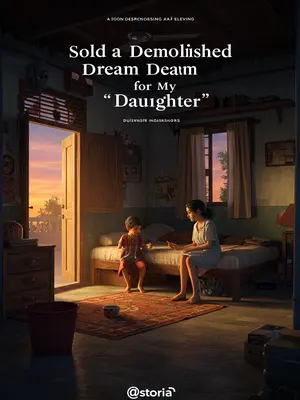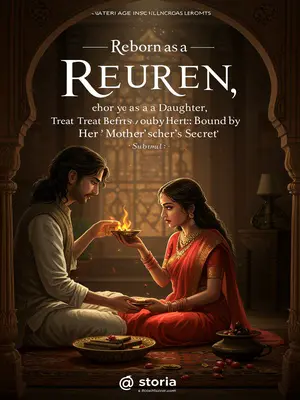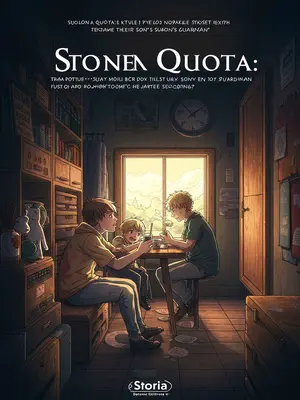Chapter 7: Games of Shadows
A gust of wind outside blew rose petals against the window screen. I recalled that spring, when I saw Second Sister’s maid lead Cousin Sharma through the corridor. Eldest Sister’s kite string was caught in the flowers, and as Cousin Sharma picked it up, he recited her favourite poem while approaching. I closed my book, watching Second Sister hide behind the garden bench, twisting her handkerchief tightly. Second Sister’s scheme was only to make Papa disappointed in Eldest Sister, so she could enter the game. I saw it all, but said nothing.
My silence was my shield. In our world, a careless word could change destinies. I told myself that it was better to be invisible, to watch and learn.
If not for fear that Eldest Sister would truly fall, I would not even have mentioned at dinner, seemingly in passing, "Eldest Sister has been idle lately, always taking me to fly kites."
The words were casual, but I saw the flicker of understanding in Father’s eyes. In the Kapoor family, even an idle remark could spark an investigation.
From the moment I understood everything, I played the role of a bystander. But now, I can no longer tell: that deep spring, was it my words that reached my parents, or did they already know, simply watching from the shadows?
Sometimes, I wonder if my own hands are stained by the very scheming I despise. In our home, innocence is a luxury we cannot afford.
Mother smiled faintly, as if seeing through my thoughts. "Your father often says, to play chess one must know how to sacrifice a piece for initiative. Sometimes, what seems a move for now is actually a killing stroke ten moves later."
Her words had the measured wisdom of someone who has seen generations rise and fall. Father’s chessboard, its ivory and ebony pieces gleaming in the lamplight, was never just a game in our house—it was a map of our lives.
She brushed aside a nonexistent stray hair by my ear, speaking earnestly. "The patterns of light and shadow in this world cannot be summed up in a few words; seeing too clearly is not always a blessing."
Her hand lingered a moment, the gesture more tender than I expected. The world outside our windows was full of sunlight, but here, in this room, every shadow told a story.
How could I not know? But in this big family home, there is no place for the dull-witted. To weigh gain and loss with clarity—is that not a kind of cruelty?
The question hovered between us, unspoken but understood. In the Kapoor family, wisdom was survival, even if it meant losing part of your soul.
"Do you know why I kept you here today?" She hesitated, then drew me into her arms, tracing the character ‘Kapoor’ stroke by stroke in my palm. "Remember, it is precisely because you are daughters of the Kapoor family that the Cabinet Secretary takes such pains to plan."
Her touch was gentle, her voice a lullaby from my childhood. In that moment, I remembered being cradled in her lap, her hands weaving jasmine into my hair.
I breathed in the faint jasmine scent on Mother, her voice as gentle as when she lulled me to sleep as a child. "Of all my daughters, you are most like your father. You must understand: the true way of a noble family is not in momentary gain or loss, but in the inheritance of a thousand generations."
The words sank into me, heavy as gold. Outside, the world waited, but within these walls, I was a Kapoor daughter, for better or worse.
Outside, the evening aarti bells sounded, and birds called beneath the eaves. Only years later, when I donned the wedding sari and married far away to Pune, did I suddenly realise: Father’s hand at chess had long mapped out everyone’s fate.
The clang of temple bells became a soundtrack to my memories, the fragrance of marigold and ghee forever linked with the fate handed down to me.
On the day Second Sister married, Consort Priya specially requested an official order, bestowing the title of Lady of Honour. This preserved the Kapoor family’s face and ensured the Singh family’s empty title did not seem too lowly.
Even as the drums beat and the shehnai wailed, I saw the relief in my brothers’ eyes, the satisfaction in Father’s posture. The game was played, and the family’s name secured.
I watched Second Sister don the peacock crown and wedding sari, her lips wearing the perfect smile, but those almond eyes that once brimmed with wit now held an unmelting chill. In this contest with Eldest Sister, she ultimately lost.
The wedding guests commented on her beauty, but I alone saw the coldness that would not thaw. The rivalry was over, but the wound remained.
At first, both elder brothers were anxious, sending trusted men to inquire at the Singh residence every month. Only a year later, when news came that Second Sister had borne a legitimate son, did their brows finally relax.
The news was greeted with sweets and laughter, the air thick with the scent of gulab jamun and sandalwood incense. In our family, an heir was the best assurance of peace.
With time, the sharpness in Second Sister’s eyes gradually faded. At Holi, when she returned home, I even saw her personally wipe sweat from General Singh’s brow, her expression gentle. Even more unexpectedly, she took the initiative to ask Mother to take her to the palace, so she could bow to Consort Priya. At that moment, she was embroidering a tiger-head cap for her infant son—a gentleness I had never seen before. Mother, hearing this, smiled all the more. Mother and daughter exchanged a smile, all understood without words.
For a brief moment, the past was forgiven, or at least set aside. In the end, survival demands adaptation, and Second Sister had learned her lesson well.
I could not tell if Second Sister had truly understood, or simply buried her unwillingness deeper. But it no longer mattered. A piece on the board must either take its place or be removed. Clearly, she chose the former.
Her laughter rang out in the courtyard again, softer, but no longer edged with bitterness. Peace, even if hard-won, was still peace.
Outside, the aarti bells rang, but inside, a single move on Father’s chessboard changed everything.













